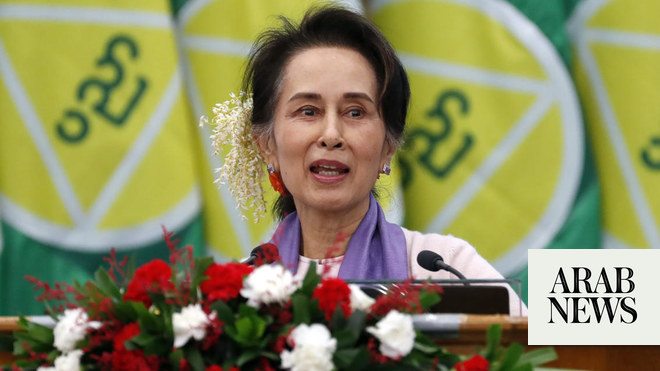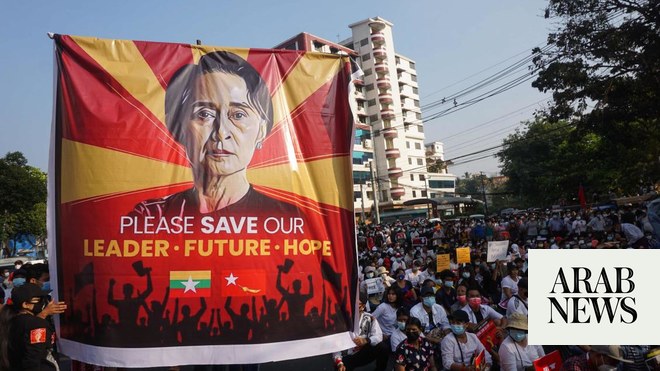
yanmar’s democratic transition in the years following 2009 was a near-miracle. To see it so callously rolled back is a tragedy, a sign that the army is nervous about giving up its power and privileges to rowdy civilian rule, as in neighbouring Thailand. With a state of emergency declared for a year and important civilian leaders detained, notably the state counsellor, Aung San Suu Kyi, Myanmar’s army will be tempted to turn the clock back and permanently hold on to power.
That would be a strategic blunder because Myanmar in 2021 is not Myanmar circa 1962, when General Ne Win seized power, or even 1988, when generals Saw Maung and Than Shwe staged a putsch in the face of civilian protests and appointed themselves to run the country via the State Law and Order Restoration Council. Myanmar today is a flawed but flourishing democracy. The ruling National League for Democracy (NLD) enjoys broad popular support, evidenced by the overwhelming mandate it received in the November 2020 elections. Ordinary Burmese have enjoyed the democratic dividend and are not about to give it up.
Despite Aung San Suu Kyi’s obviously tainted legacy (due to her wilful support of the brutal pogrom against the Rohingya) and indifferent track record in introducing broad economic reforms, she and the NLD are the pivotal civilian organising forces in the country. International critics of Aung San Suu Kyi have expressed little sympathy for her detention but the hard reality is that she will have to be a part of any negotiated political settlement. Like Myanmar’s armed forces, the NLD’s gerontocratic leadership has done a terrible job in grooming a new generation of leaders.
The international community, led by G7 members, has issued obligatory statements condemning the army’s decision to stage a coup. Thailand has described the move as an “internal matter” and other Association of Southeast Asian Nations (Asean) members have called for restraint. The two countries with the greatest leverage on Myanmar – India and China – will be calibrating their response based on strategic considerations. India has called for the rule of law and democratic process to be upheld, perhaps calculating that army rule in the long-run is unsustainable. China is likely to take the Thai road by describing the developments as an internal matter. It is useful to remember that China was Myanmar’s only strategic economic and political partner during the dark era of Than Shwe’s rule. Democracy and civilian rule in Myanmar has not been kind to China, and Beijing will be eager to restore its status as the country’s indispensable partner. With China on its side, the army will find little reason to articulate a pathway toward a full restoration of democracy.
A newly energised America, with the backing of Europe and Australia, faces its first global test. It will be a face-off with China as Joe Biden will have to fulfil lofty campaign promises about restoring democracy and human rights as the centrepiece of US foreign policy. But he has limited options. The US can introduce further sweeping sanctions to the ones already in place, targeting senior army officials complicit in the violence against the Rohingya. However, Myanmar is not Iran, a country that was forced to the negotiating table because of crippling sanctions. As an exporter of oil, which is traded in US dollars, Iran was always going to be vulnerable to sanctions. Myanmar is not as dependent on the dollar to grow its economy. The country has a thriving border trade with India, China and Thailand, some of it illegal, and the country can arguably carry on for years in isolation. So, what can be done?
The only viable path forward for Myanmar is a negotiated political settlement with international oversight, which will see the restoration of full civilian rule and recognition of the November 2020 election outcome. Also central to any settlement would be according official recognition to the Rohingya in Myanmar society, which would allow for a peaceful return of millions of refugees, currently living stateless in Bangladesh in inhospitable and inhumane conditions. Anything short of these will be a disaster, which would further damage Myanmar’s vulnerable economic situation and plunge millions back into poverty. The first option would be to allow the Myanmar junta to negotiate with the NLD, without foreign interference, and arrive at a peaceful settlement within the clearly delineated red lines of recognising the outcome of the November elections and return of the Rohingya. If this process fails and there is prolonged civil unrest, international involvement will become inevitable.
It would be tragic if Myanmar’s political future becomes intertwined in geopolitics and the US-China cold war, with Washington and Beijing taking opposing sides on the issue. One possible model would be the UN-mandated internationally guaranteed comprehensive settlement for Cambodia in 1991, which was driven by France and Indonesia, and had involved the US, USSR, Vietnam, many other Asean members, and India. The Cambodia issue was wider in terms of its global ramifications, and any resolution of Myanmar’s political mess will not require a crowded field of global participants. Given its democratic credentials, Indonesia is once again the logical choice to steer this process forward, with the active participation of the US, China, Bangladesh and India.
A final word about Aung San Suu Kyi. Her calculated strategy of transforming herself from an icon of democracy into a cynical nationalist politician who could do business with the army has failed spectacularly. Her record of tacitly supporting the army’s horrific persecution of the Rohingya and defending it at the international court of justice is unpardonable and will haunt her for ever. But Aung San Suu Kyi is not Myanmar and the international community should do all that it can to help fulfil her original vision of a peaceful, democratic and inclusive Myanmar.
Vasuki Shastry is an associate fellow with the Asia-Pacific Programme, Chatham House, and the author of the forthcoming Has Asia Lost It? Dynamic Past, Turbulent Future












